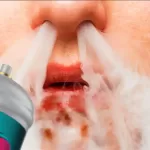Saunas can offer relaxation, but spending too long inside without proper hydration can lead to heat stroke, doctors warn.
A new case study has raised alarms about the potentially life-threatening risks of prolonged sauna use, emphasizing the importance of staying hydrated and mindful of the time spent in high-heat environments. While saunas are often associated with relaxation and health benefits, doctors are warning that excessive exposure to heat without proper precautions can lead to dangerous health complications.
Sauna Safety Risks
Doctors have sounded the alarm after a case published in BMJ Case Reports revealed that prolonged sauna use, especially without proper hydration, can lead to severe heat stroke. While heat stroke is considered rare, it can be life-threatening, even in individuals without pre-existing health conditions.
Heat stroke occurs when the body’s core temperature rises above 40°C (104°F), impairing brain function and other vital organs. Non-exertional heat stroke, as it is known, happens after extended exposure to high environmental temperatures, such as those found in saunas.
Case Study: Severe Heat Stroke in a Sauna
In one notable case, a woman in her early 70s was found unconscious in her local gym’s sauna after spending around 45 minutes performing stretching exercises. Her core body temperature had soared to 42°C (107.6°F), significantly higher than the normal 36.4°C (97.5°F). Her blood pressure was dangerously low, and her heart rate was abnormally high. Upon arrival at the emergency room, she suffered a seizure.
Though the woman had a history of type 1 diabetes and an underactive thyroid, she was otherwise healthy, with no smoking or drinking habits and a regular gym routine. Doctors point out that while she did have some risk factors, her overall health was not considered to be in danger from the sauna.
Medical Intervention and Recovery
Immediate treatment for the woman included cooling her body with wet towels and a fan, along with intravenous fluids and blood products to stabilize her. Blood tests revealed signs of kidney and liver malfunction, a minor heart attack, and muscle tissue breakdown. Remarkably, she regained consciousness within two hours and made significant progress over the next few days, although she remained confused and drowsy for 48 hours.
She spent 12 days in the hospital, with a full recovery after 26 days, experiencing only mild fatigue and some liver function disturbances.
Wider Implications and Prevention Strategies
This case highlights the potential dangers of saunas, particularly in older individuals or those with underlying conditions. The authors of the study note that while only a few similar cases have been documented, the risks remain significant. Tragically, 3 of the 9 reported cases resulted in death. The prognosis for heat stroke, especially in elderly patients, is often poor, with mortality rates exceeding 50% when multiple organs are involved.
As global temperatures rise and heatwaves become more frequent, experts warn that heat-related deaths, particularly those caused by heat stroke, are expected to increase. The authors stress the importance of rapid cooling for anyone suffering from heat stroke, as prolonged exposure to high temperatures can lead to irreversible cellular damage.
The woman involved in this case shared her experience, noting the vital lesson: “My experience has emphasized the dangers of saunas and how important it is to be fully hydrated before entering. I never had issues before, but on reflection, I believe I hadn’t drunk enough water.”
Conclusion
This new research serves as an important reminder of the dangers of prolonged sauna use, especially for individuals who may be unaware of the risks or neglect proper hydration. While saunas remain a popular wellness practice, it is essential for users to remain cautious and prioritize their health when spending time in such high-heat environments.
Reference: “Severe heat stroke with multiorgan failure following collapse in a sauna,” BMJ Case Reports, 7 January 2025, DOI: 10.1136/bcr-2024-262069.












